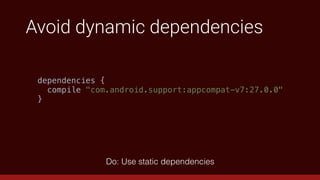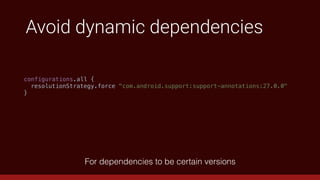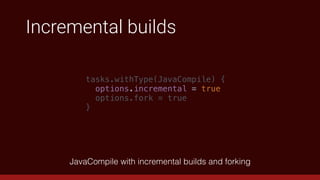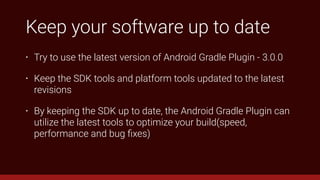Make Your Build Great Again (DroidConSF 2017)
- 1. Jared Burrows Make Your Build Great Again
- 2. Motivation • Yammer is a social networking service used for communication within an organization • Current debug builds are currently multidex • More features and more code leads to slower builds • More libraries leads to slower builds
- 3. Results Faster CI builds, Merge pull requests faster, Iterate faster Before After Reduction Time(min) ~18+ ~11 38.89%
- 4. What can we optimize? • Software - Gradle - Android Gradle Plugin - Android Studio/Intellij • Hardware - Increase CPU - Increase Memory
- 5. What to look for • Cause of the build slowness • Identify bottlenecks during start up and between tasks • Find and remove unnecessary dependencies/plugins • Module and build.gradle structure
- 6. Where to start • Start from the bottom of your tooling • Better developer laptops and/or build agents • Optimize and configure Gradle • Optimize and configure Android Gradle Plugin • Optimize and configure Android Studio
- 7. Optimizing your Gradle setup
- 8. Keep your software up to date • Try to use the latest version of Gradle - 4.3 • Ensures compatibility between minor versions • Make transitioning to the next major version easier • Use Gradle with the latest major version of JVM - 1.8
- 10. Enable the Gradle daemon • Each time you run Gradle, it kicks off a new instance of Gradle • Use the daemon to avoid the cost of JVM startup time for each build • Starting in 3.0+, the Daemon is on by default!
- 12. Increase daemon’s heap size • By default Gradle will reserves 1GB of heap space • Android projects usually need more memory • As of AGP 2.1+, you want at least 2GB for “Dex in Process” • Giving more memory will help dramatically speed up builds for larger projects
- 14. gradle.properties, cont. org.gradle.daemon=true org.gradle.jvmargs=-Xmx2048m Example “gradle.properties” file usage
- 15. Enable parallel builds • Execute Gradle tasks in parallel to speed up builds • Helpful for multi-module builds that are decoupled • JavaCompile tasks - Compile in separate process • Test tasks - Run tests in separate process
- 16. gradle.properties, cont. org.gradle.daemon=true org.gradle.jvmargs=-Xmx2048m Example “gradle.properties” file usage
- 18. JavaCompile tasks separate process tasks.withType(JavaCompile) { options.fork = true } Configure all “JavaCompile” tasks to fork
- 19. Running tests in separate process tasks.withType(Test) { def maxCount = gradle.startParameter.maxWorkerCount maxParallelForks = (maxCount < 2) ? 1 : maxCount / 2 forEvery = 100 } Configure all “Test” tasks to fork every 100 tests
- 20. Running tests in separate process, cont. tasks.withType(Test) { maxParallelForks = Runtime.runtime.availableProcessors().intdiv(2) ?: 1 forkEvery = 100 } Configure all “Test” tasks to fork every 100 tests
- 21. Running tests in separate process, cont. $ gradlew testDebug > Task :testDebugUnitTest <============-> 97% EXECUTING [17s] > :testDebugUnitTest > 17 tests completed > :testDebugUnitTest > Executing test com.example.SomeTest BUILD SUCCESSFUL in 17s 28 actionable tasks: 26 executed, 2 up-to-date Unit tests running in 1 worker process
- 22. Running tests in separate process, cont. $ gradlew testDebug > Task :testDebugUnitTest <============-> 97% EXECUTING [17s] > :testDebugUnitTest > 17 tests completed > :testDebugUnitTest > Executing test com.example.SomeTest1 > :testDebugUnitTest > Executing test com.example.SomeTest2 > :testDebugUnitTest > Executing test com.example.SomeTest3 > :testDebugUnitTest > Executing test com.example.SomeTest4 BUILD SUCCESSFUL in 10s 28 actionable tasks: 2 executed, 26 up-to-date Unit tests running in 4 parallel workers processes
- 23. Enable configure on demand • Only configure projects needed based on the specified task • For projects with many subprojects, it avoids unnecessary configuration, saving time • Works best for projects that have many decoupled modules • Using “subprojects”/“allprojects” removes these benefits since they are executed eagerly
- 26. Enable build cache • Incremental builds will helps avoid work that is already done • When switching branches, you are forced to rebuild over again but local build cache remembers this previous results • Extra beneficial when build different product flavors for Android builds (even different task names, reuse between flavors) • When working on a team, you might want to consider Gradle’s remote build cache, so you can share build outputs with developers
- 29. build.gradle
- 30. Apply plugins judiciously • Similar to adding dependencies, only add them to the modules that need them • Try not to use “subprojects” or “allprojects” block to apply plugins unless all of the subprojects actually use them! • Limiting the scope of applying your plugins help speed up builds
- 31. Avoid plugins that block/slow configuration • Check for plugins that resolve/configure slowly • Applying plugins + evaluating build scripts + running “afterEvaluate” = Configuration time • From Stefan Oehme’s talk, “Android Performance Pitfalls”, at Gradle Summit 2017, he mentioned that having a configuration time of less than 1 second or less is good youtube.com/watch?v=TGUwevlaNNU
- 32. Avoid plugins that block/slow configuration $ gradlew > Task :help Welcome to Gradle 4.3. To run a build, run gradle <task> ... To see a list of available tasks, run gradle tasks To see a list of command-line options, run gradle --help To see more detail about a task, run gradle help --task <task> BUILD SUCCESSFUL in 0s 1 actionable task: 1 executed Normal execution time
- 33. Avoid plugins that block/slow configuration buildscript { repositories { google() maven { url "https://plugins.gradle.org/m2/" } } dependencies { classpath "com.android.tools.build:gradle:3.0.0" classpath "some:slow-plugin:1.0.0" } } apply plugin: "com.android.application" apply plugin: "slow-plugin" Example of a slow plugin slowing down the configuration
- 34. Avoid plugins that block/slow configuration buildscript { repositories { google() maven { url "https://plugins.gradle.org/m2/" } } dependencies { classpath "com.android.tools.build:gradle:3.0.0" classpath "some:slow-plugin:1.0.0" } } apply plugin: "com.android.application" apply plugin: "slow-plugin" Example of a slow plugin slowing down the configuration
- 35. Avoid plugins that block/slow configuration buildscript { def isCi = rootProject.hasProperty("ci") repositories { google() maven { url "https://plugins.gradle.org/m2/" } } dependencies { classpath "com.android.tools.build:gradle:3.0.0" classpath "some:slow-plugin:1.0.0" } } apply plugin: "com.android.application" apply plugin: "slow-plugin" Use a property to check if we are on the CI
- 36. Avoid plugins that block/slow configuration buildscript { def isCi = rootProject.hasProperty("ci") repositories { google() maven { url "https://plugins.gradle.org/m2/" } } dependencies { classpath "com.android.tools.build:gradle:3.0.0" if (isCi) classpath "some:slow-plugin:1.0.0" } } apply plugin: "com.android.application" if (isCi) apply plugin: "slow-plugin" Use the property to disable the plugin from being applied locally
- 37. Minimize repository count • Most popular repositories include: • jcenter() • mavenCentral() • maven { url "https://plugins.gradle.org/m2/" } • google() (Gradle 4+) or maven { url "https://maven.google.com" } • maven { url "https://jitpack.io" }
- 38. Minimize repository count allprojects { repositories { jcenter() mavenCentral() maven { url "https://plugins.gradle.org/m2/" } google() maven { url "https://jitpack.io" } } } Most likely using too many repositories here!
- 39. Minimize repository count • jcenter() and mavenCentral() - may host the same dependencies • google() - only provides Android and Google dependencies • maven { url "https://plugins.gradle.org/m2/" } - hosts Gradle plugins and mirrors dependencies from jcenter() • maven { url "https://jitpack.io" } - should be used sparingly as it is used to grab a specific branch or commit of a particular open source repository
- 40. Minimize repository count allprojects { repositories { jcenter() mavenCentral() maven { url "https://plugins.gradle.org/m2/" } google() maven { url "https://jitpack.io" } } } What to remove?
- 41. Minimize repository count allprojects { repositories { jcenter() mavenCentral() maven { url "https://plugins.gradle.org/m2/" } google() maven { url "https://jitpack.io" } } } What to remove?
- 42. Minimize repository count repositories { jcenter() mavenCentral() maven { url "https://plugins.gradle.org/m2/" } google() maven { url "https://jitpack.io" } } What to remove?
- 43. Minimize repository count What to remove? repositories { jcenter() mavenCentral() maven { url "https://plugins.gradle.org/m2/" } google() maven { url "https://jitpack.io" } }
- 44. Minimize repository count What to remove? repositories { jcenter() maven { url "https://plugins.gradle.org/m2/" } google() maven { url "https://jitpack.io" } }
- 45. Minimize repository count What to remove? repositories { jcenter() maven { url "https://plugins.gradle.org/m2/" } google() maven { url "https://jitpack.io" } }
- 46. Minimize repository count What to remove? repositories { maven { url "https://plugins.gradle.org/m2/" } google() maven { url "https://jitpack.io" } }
- 47. Minimize repository count What to remove? repositories { maven { url "https://plugins.gradle.org/m2/" } google() maven { url "https://jitpack.io" } }
- 48. Minimize repository count Minimal as possible for this example! repositories { maven { url "https://plugins.gradle.org/m2/" } google() }
- 49. Avoid dynamic dependencies (+) • Can cause unexpected version updates • Difficulty resolving version differences • Slower builds caused by always checking for updates
- 50. Avoid dynamic dependencies dependencies { compile "com.android.support:appcompat-v7:+" } Don’t: Use dynamic dependencies
- 51. Avoid dynamic dependencies Don’t: Use dynamic dependencies dependencies { compile "com.android.support:appcompat-v7:+" }
- 52. Avoid dynamic dependencies • Instead of guessing or grabbing the latest dependency via (+), let’s find the latest release • Using Ben Mane’s Gradle Version plugin, you can find the latest plugin and dependencies versions • Instead of having to search for each dependency individually
- 53. Avoid dynamic dependencies $ gradlew dependencyUpdates > Task :dependencyUpdates ------------------------------------------------------------ : Project Dependency Updates (report to plain text file) ------------------------------------------------------------ The following dependencies are using the latest milestone version: - com.android.support:appcompat-v7:27.0.0 - com.github.ben-manes:gradle-versions-plugin:0.17.0 Generated report file build/dependencyUpdates/report.txt BUILD SUCCESSFUL in 0s 1 actionable task: 1 executed github.com/ben-manes/gradle-versions-plugin
- 54. Avoid dynamic dependencies dependencies { compile "com.android.support:appcompat-v7:+" } Don’t: Use dynamic dependencies
- 55. Avoid dynamic dependencies Do: Use static dependencies dependencies { compile "com.android.support:appcompat-v7:27.0.0" }
- 56. Avoid dynamic dependencies For dependencies to be certain versions configurations.all { resolutionStrategy.force "com.android.support:support-annotations:27.0.0" }
- 57. Avoid unnecessary/unused dependencies • For mobile builds, try not to add large dependencies • Scan for and remove extra/unused dependencies that maybe sitting in the “compile”/“implementation” configurations • Determine which libraries that you are not using heavily or should not be on mobile (eg. Guava, Jackson instead of Gson) • My talk called, “The Road to Single DEX” goes into more detail
- 58. Enable incremental builds • Allow Gradle to resources already compiled resources to make the builds even faster • It only compiles only those java classes that were changed or that are dependencies to the changed classes
- 59. Incremental builds tasks.withType(JavaCompile) { options.fork = true } From our previous JavaCompile example
- 60. Incremental builds tasks.withType(JavaCompile) { options.incremental = true options.fork = true } JavaCompile with incremental builds and forking
- 61. Incremental builds • However, libraries such as AutoValue, Glide, Butterknife, Dagger that use annotation processing disable incremental builds! • In AGP 3.0+, I believe support for annotation processing and incremental builds are a priority
- 62. Incremental builds JavaCompile with incremental builds and forking tasks.withType(JavaCompile) { options.incremental = true options.fork = true }
- 63. Incremental builds tasks.withType(JavaCompile) { options.incremental = true options.fork = true doFirst { println "Task ${path} annotation processors: ${effectiveAnnotationProcessorPath.asPath}" } } JavaCompile tasks will print annotation processors
- 64. Optimizing Your AGP Setup
- 65. Keep your software up to date • Try to use the latest version of Android Gradle Plugin - 3.0.0 • Keep the SDK tools and platform tools updated to the latest revisions • By keeping the SDK up to date, the Android Gradle Plugin can utilize the latest tools to optimize your build(speed, performance and bug fixes)
- 66. Removing unnecessary flavors android { buildTypes { debug {} release { minifyEnabled = true } } flavorDimensions "dim" productFlavors { nightly { dimension "dim" } prod { dimension "dim" } } } Example show buildTypes with productFlavors
- 67. Removing unnecessary flavors $ gradlew tasks > Task :tasks Build tasks ----------- assemble - Assembles all variants of all applications and secondary packages. assembleAndroidTest - Assembles all the Test applications. assembleDebug - Assembles all Debug builds. assembleNightly - Assembles all Nightly builds. assembleProd - Assembles all Prod builds. assembleRelease - Assembles all Release builds. BUILD SUCCESSFUL in 0s 1 actionable task: 1 executed Produces 4 tasks - Debug/Nightly/Prod/Release
- 68. Removing unnecessary flavors def isNightly = project.hasProperty("nightly") android { buildTypes { debug { if (isNightly) { minifyEnabled = true applicationIdSuffix = ".nightly" } else { applicationIdSuffix = ".debug" } } release { minifyEnabled = true } } } Exact same example with no productFlavors. Use “gradlew -Pnightly” for “nightly”.
- 69. Removing unnecessary flavors $ gradlew tasks > Task :tasks Build tasks ----------- assemble - Assembles all variants of all applications and secondary packages. assembleAndroidTest - Assembles all the Test applications. assembleDebug - Assembles all Debug builds. assembleRelease - Assembles all Release builds. BUILD SUCCESSFUL in 0s 1 actionable task: 1 executed Produces 2 tasks - Debug/Release
- 70. Removing unnecessary flavors android { buildTypes { debug {} release { minifyEnabled = true } } flavorDimensions "dim" productFlavors { nightly { dimension "dim" } prod { dimension "dim" } } variantFilter { variant -> def names = variant.flavors*.name if (names.contains("nightly")) { variant.ignore = true } } } You can also use “android.variantFilter”. This example removes “nightly”.
- 71. Avoid compiling unnecessary resources • Use "resConfigs" to filter out localizations that you do not want/support in your app
- 72. Avoid compiling unnecessary resources Using “resConfigs” to keep English only android { defaultConfig { resConfigs "en" } }
- 73. Avoid compiling unnecessary resources Using “resConfigs” to keep multiple resources or languages android { defaultConfig { resConfigs "en","de","fr" } }
- 74. Static constants for builds • Using dynamic variables that change your current build.gradle files or resources will add to the build time • Resources changed on each build prevent Instant Run from performing a code swap • Use static values for debug builds to prevent a full rebuilds of the APK
- 75. Static constants for builds android { compileSdkVersion 27 buildToolsVersion "27.0.0" defaultConfig { applicationId "burrows.apps.example" versionCode new Date().format("ddMMyyHHmm").toInteger() versionName "1.0" minSdkVersion 19 targetSdkVersion 27 } } On each build, the “versionCode” is updated with a new value
- 76. Static constants for builds android { compileSdkVersion 27 buildToolsVersion "27.0.0" defaultConfig { applicationId "burrows.apps.example" versionCode new Date().format("ddMMyyHHmm").toInteger() versionName "1.0" minSdkVersion 19 targetSdkVersion 27 } } On each build, the “versionCode” is updated with a new value
- 77. Static constants for builds def isRelease = project.hasProperty("release") android { compileSdkVersion 27 buildToolsVersion "27.0.0" defaultConfig { applicationId "burrows.apps.example" versionCode isRelease ? new Date().format("ddMMyyHHmm").toInteger() : 1 versionName "1.0" minSdkVersion 19 targetSdkVersion 27 } } Now, only release builds will be given an updated value
- 78. Create library modules • Gradle will only compile the modules you modify • Cache those outputs for future builds • Improves effectiveness of “configuration on demand” and “parallel” execution • Particularly helpful when packaging by feature
- 79. Disable PNG crunching • If you can’t convert your PNGs to WebP, use PNG crunching • By disabling, AGP will not compress the PNGs on each build • Starting in AGP 3.0.0+, PNG crunching is disabled by default for “debug” build types
- 80. Disable PNG crunching android { aaptOptions { cruncherEnabled = project.hasProperty("ci") } } For AGP <= 2.3.3, use “aaptOptions.cruncherEnabled = false”
- 81. Avoid legacy multidex • “minSdkVersion” < 21 - legacy mutlidex • “minSdkVersion” >= 21 - native multidex • We can speed up development builds by using “productFlavors” or Gradle properties to toggle the “minSdkVersion” for faster build times
- 82. Avoid legacy multidex android { compileSdkVersion 27 buildToolsVersion "27.0.0" defaultConfig { applicationId "burrows.apps.example" versionCode 1 versionName "1.0" minSdkVersion 19 targetSdkVersion 27 multiDexEnabled true } } Example that uses legacy multidex
- 83. Avoid legacy multidex android { compileSdkVersion 27 buildToolsVersion "27.0.0" defaultConfig { applicationId "burrows.apps.example" versionCode 1 versionName "1.0" minSdkVersion 19 targetSdkVersion 27 multiDexEnabled true } } Example that uses legacy multidex
- 84. Avoid legacy multidex android { compileSdkVersion 27 buildToolsVersion "27.0.0" defaultConfig { applicationId "burrows.apps.example" versionCode 1 versionName "1.0" minSdkVersion rootProject.hasProperty("lollipop") ? 21 : 19 targetSdkVersion 27 multiDexEnabled true } } Example that uses legacy multidex
- 85. Disable pre-dexing libraries on CI • Java class files need to be converted to DEX files • Helps to speed up the build for incremental builds locally • On a CI server, where you run clean builds, pre-dexing can have the reverse affect, so we can disable it
- 86. Disable pre-dexing libraries android { dexOptions { preDexLibraries = !project.hasProperty("ci") } } Set “preDexLibraries” to false when on the CI
- 87. Enable Build Cache • Stores certain outputs that the Android plugin for Gradle generates when building your project (ex. unpackaged AARs, pre-dexed dependencies) • Improves performance of clean builds by reusing cached files • Starting in AGP 2.3.0+, build cache is enabled by default
- 89. gradle.properties, cont. # Gradle specific org.gradle.daemon=true org.gradle.jvmargs=-Xmx2048m org.gradle.parallel=true org.gradle.configureondemand=true org.gradle.caching=true Example “gradle.properties” file usage
- 90. gradle.properties, cont. # Gradle specific org.gradle.daemon=true org.gradle.jvmargs=-Xmx2048m org.gradle.parallel=true org.gradle.configureondemand=true org.gradle.caching=true # Android specific android.enableBuildCache=true Example “gradle.properties” file usage
- 91. Enable new DEX Compiler • DEX compilation is the process of transforming .class bytecode into .dex bytecode • DX vs D8: compiles faster and outputs smaller .dex files • D8 has the same or better app runtime performance • Starting in AGP 3.0.0+, you can toggle this on to test it • Starting in AGP 3.1.0+, this is enabled by default
- 92. gradle.properties, cont. # Gradle specific org.gradle.daemon=true org.gradle.jvmargs=-Xmx2048m org.gradle.parallel=true org.gradle.configureondemand=true org.gradle.caching=true # Android specific android.enableBuildCache=true Example “gradle.properties” file usage
- 93. gradle.properties, cont. # Gradle specific org.gradle.daemon=true org.gradle.jvmargs=-Xmx2048m org.gradle.parallel=true org.gradle.configureondemand=true org.gradle.caching=true # Android specific android.enableBuildCache=true android.enableD8=true Example “gradle.properties” file usage
- 94. Optimizing Your Android Studio Usage
- 95. Convert images to WebP • Reduces image sizes by converting to WebP • Does not need to compress at build time(PNG crunching) • By converting beforehand, this will help speed up your build
- 96. Convert images to WebP Right-click on “drawable” folders, click on “Convert to WebP”
- 97. Enable Instant Run • Push certain code and resource changes to your running app without building a new APK • Some cases, without even restarting the current activity
- 98. Enable Instant Run In “Preferences”, under “Build, Execution, Deployment”, turn on “Enable Instant Run”
- 99. Enable offline mode • If do not need to update dependencies or plugins frequently, you would greatly benefit from compiling offline • This skips dependency resolution and downloading and uses cache only • For command line: “gradlew --offline”
- 100. Enable offline mode In “Preferences”, under “Build, Execution, Deployment”, turn on “Offline work”
- 101. What now?
- 102. Profiling builds • “gradlew --profile” (built in) • “gradlew --scan” (docs.gradle.com/build-scan-plugin) • For more tools: github.com/gradle/gradle-profiler
- 103. Profiling builds Example of “gradlew clean assembleDebug --profile”
- 104. Profiling builds Example of “gradlew clean assembleDebug --scan”
- 105. Results Faster CI builds, Merge pull requests faster, Iterate faster Before After Reduction Time(min) ~18+ ~11 38.89%





















![Running tests in separate process, cont.
$ gradlew testDebug
> Task :testDebugUnitTest
<============-> 97% EXECUTING [17s]
> :testDebugUnitTest > 17 tests completed
> :testDebugUnitTest > Executing test com.example.SomeTest
BUILD SUCCESSFUL in 17s
28 actionable tasks: 26 executed, 2 up-to-date
Unit tests running in 1 worker process](https://image.slidesharecdn.com/make-your-build-great-again-171106223839/85/Make-Your-Build-Great-Again-DroidConSF-2017-21-320.jpg)
![Running tests in separate process, cont.
$ gradlew testDebug
> Task :testDebugUnitTest
<============-> 97% EXECUTING [17s]
> :testDebugUnitTest > 17 tests completed
> :testDebugUnitTest > Executing test com.example.SomeTest1
> :testDebugUnitTest > Executing test com.example.SomeTest2
> :testDebugUnitTest > Executing test com.example.SomeTest3
> :testDebugUnitTest > Executing test com.example.SomeTest4
BUILD SUCCESSFUL in 10s
28 actionable tasks: 2 executed, 26 up-to-date
Unit tests running in 4 parallel workers processes](https://image.slidesharecdn.com/make-your-build-great-again-171106223839/85/Make-Your-Build-Great-Again-DroidConSF-2017-22-320.jpg)



















































































